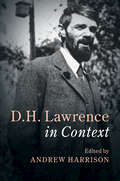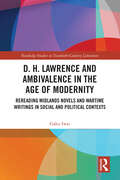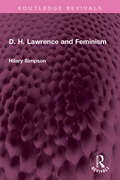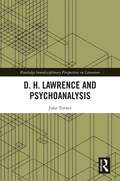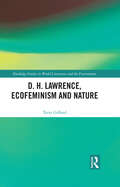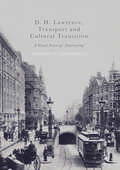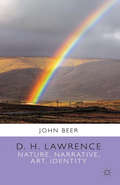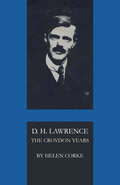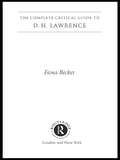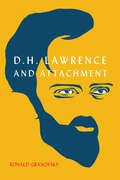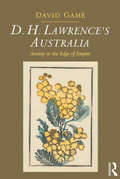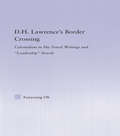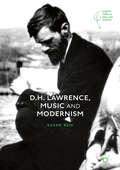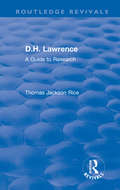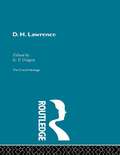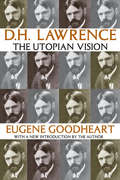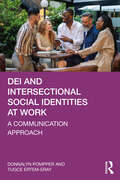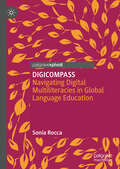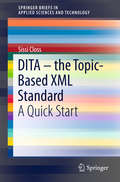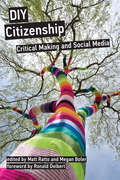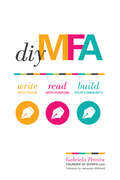- Table View
- List View
D. H. Lawrence
by John BeerA full account of Lawrence, ranging from his talent as a young writer to the continuing genius of his later work, and concentrating on his exceptionally acute powers of observation, both human and natural.
D. H. Lawrence
by Ronald P. DraperLawrence is now an accepted major writer--with W. B. Yeats and T. S. Eliot, I should say, he is one of the three most important writers in English in the twentieth century--and it is fitting that his work should be accorded the same critical treatment that is given to other major writers. Moreover, Lawrence's own famous dictum--"Never trust the artist. Trust the tale. The proper function of a critic is to save the tale from the artist who created, it."--should also be applied to his own work. Lawrence is read, and will continue to be, for his novels, tales, and poems; and these must be preserved, not only from injudicious admirers and detractors, but, where necessary, from the misrepresentations that derive from Lawrence's own didactic rather than artistic self.
D. H. Lawrence In Context (Literature in Context)
by Andrew HarrisonThis collection of original, concise essays by leading international scholars draws closely on the Cambridge Edition of the Letters and Works of D. H. Lawrence to provide up-to-date insights into the key contexts to the author's life, career and legacy. It opens with an overview of Lawrence's life as it is explored in biographies and revealed in his letters and writing, before reassessing his relationship to the contemporary literary marketplace, and his response to - and intervention in - a range of literary/cultural and social/historical contexts. It ends with sections on Lawrence's changing critical reception and his powerful legacy in the work of later authors and filmmakers. The essays present a detailed and nuanced picture of Lawrence as an enterprising professional author with a truly cosmopolitan outlook who engaged deeply and strongly with his contemporary culture, and with currents of thought across a range of disciplines.
D. H. Lawrence and Ambivalence in the Age of Modernity: Rereading Midlands Novels and Wartime Writings in Social and Political Contexts (Routledge Studies in Twentieth-Century Literature)
by Gaku IwaiD. H. Lawrence is renowned for his scathing criticism of the ruling class, industrialisation of the country and wartime patriotism. However, his texts bear the imprint of contemporary dominant ideologies and discourses of the period. Comparing Lawrence’s texts to various major and minor contemporary novels, journal articles, political pamphlets and history books, this book aims to demonstrate that Lawrence’s texts are ambivalent: his texts harbour the dynamism of conflicting power struggles between the subversive and the reactionary. For example, in some apparently apolitical texts such as The White Peacock and Movements in European History, reactionary ideologies and wartime propaganda are embedded. Some texts like Lady Chatterley’s Lover are intended to be a radical critique of the period wherein it was composed, but they also bear discernible traces of the contemporary frame of reference that they intend to subvert. Focusing on Lawrence’s stories and novels set in the mining countryside and the works composed under the impact of the First World War, this book establishes that Lawrence’s texts in fact consist of multiple layers that are often in conflict with each other, serving as a testimony to the age of modernity.
D. H. Lawrence and Feminism (Routledge Revivals)
by Hilary SimpsonFirst published in 1982, D. H. Lawrence and Feminism discusses Lawrence’s work by examining it in relation to aspects of women’s history and the development of feminism. Two different modes of pre-war feminism which provide important themes in Lawrence’s early writings are examined in the opening chapters. The central chapters deal with the war, both as a catalyst for major changes in the position of women and as a point of no return in the development of Lawrence’s work. A final chapter looks at the way in which Lawrence used women as collaborator, and their writing as source material. This book will be of interest to students of literature, women’s studies and history.
D. H. Lawrence and Psychoanalysis (Routledge Interdisciplinary Perspectives on Literature)
by John TurnerThis book opens out a wholly new field of enquiry within a familiar subject: it offers a detailed – yet eminently readable – historical investigation, of a kind never yet undertaken, of the impact of psychoanalysis (at a crucial moment of its history) on the thinking and writing of D.H. Lawrence. It considers the impact on his writing, through his relationship with Frieda Weekley, of the maverick Austrian analyst Otto Gross; it situates the great works of 1911-20 in relation to the controversial issues at stake in the Freud-Jung quarrel, about which his good friend, the English psychoanalyst David Eder, kept him informed; and it explores his sympathy with the maverick American analyst Trigant Burrow. It is a study to interest a literary audience by its close reading of Lawrence’s texts, and a psychoanalytic audience by its detailed consideration of the contribution made to contemporary debate by three comparatively neglected analytic thinkers.
D. H. Lawrence, Ecofeminism and Nature (Routledge Studies in World Literatures and the Environment)
by Terry GiffordThis is the first ecocritical book on the works of D. H. Lawrence and also the first to consider the links between nature and gender in the poetry and the novels. In his search for a balanced relationship between male and female characters, what role does nature play in the challenges Lawrence offers his readers? How far are the anxieties of his characters in negotiating relationships that might threaten their sense of self derived from the same source as their anxieties about engaging with the Other in nature? Indeed, might Lawrence’s metaphors drawn from nature actually be the causes of human actions in The Rainbow, for example? The originality of Lawrence’s poetic and narrative strategies for challenging social attitudes towards both nature and gender can be revealed by new approaches offered by ecocritical theory and ecofeminist readings of his books. This book explores ecocritical notions to frame its ecofeminist readings, from the difference between the ‘Other’ and ‘otherness’ in The White Peacock and Lady Chatterley’s Lover, ‘anotherness’ in the poetry of Birds, Beasts and Flowers, psychogeography in Sea and Sardinia, emergent ecofeminism in Sons and Lovers, land and gender in The Boy in the Bush, gender dialogics in Kangaroo, human animality in Women in Love, trees as tests in Aaron’s Rod, to ‘radical animism’ in The Plumed Serpent. Finally, three late tales provide a reassessment of ecofeminist insights into Lawrence’s work for readers in the present context of the Anthropocene.
D. H. Lawrence, Transport and Cultural Transition: 'A Great Sense of Journeying'
by Andrew F. HumphriesThis book discusses D. H. Lawrence's interest in, and engagement with, transport as a literal and metaphorical focal point for his ontological concerns. Focusing on five key novels, this book explores issues of mobility, modernity and gender. First exploring how mechanized transportation reflects industry and patriarchy in Sons and Lovers, the book then considers issues of female mobility in The Rainbow, the signifying of war transport in Women in Love, revolution and the meeting of primitive and modern in The Plumed Serpent, and the reflection of dystopian post-war concerns in Lady Chatterley's Lover. Appealing to Lawrence, modernist, and mobilities researchers, this book is also of interest to readers interested in early twentieth century society, the First World War and transport history.
D. H. Lawrence: Nature, Narrative, Art, Identity
by J. BeerA full account of Lawrence, ranging from his talent as a young writer to the continuing genius of his later work, and concentrating on his exceptionally acute powers of observation, both human and natural.
D. H. Lawrence: The Croydon Years
by Helen CorkeCroydon, England, was the setting of the famous three-way friendship of D. H. Lawrence, Jessie Chambers, and Helen Corke, all of whom made literary records of their association, and all of whom appeared as characters in Lawrence novels. Perhaps the most objective of these records were Helen Corke’s, which became difficult to acquire. Their scarcity and their continuing usefulness were the stimulus for publication of this volume, which contains in four statements Helen Corke’s “major comment on Lawrence the man and Lawrence the artist.” The “Portrait of D. H. Lawrence, 1909–1910,” a section from Corke’s unpublished autobiography, gives the reader glimpses into the earliest stages of the Lawrence-Corke friendship, when Lawrence worked to bring meaning back into Corke’s life after she had suffered a tragic loss. The “Portrait” tells of conversations before a log fire, German lessons, the reading of poetry, and sessions over Lawrence’s manuscript “Nethermere,” which the publishers renamed The White Peacock. In “Portrait,” Corke tells of working with Lawrence on revising the proofs of this book, of Lawrence’s encouragement of her own literary efforts, of their wandering together in the Kentish hill country, and of her first meeting with Jessie Chambers. “Lawrence’s ‘Princess’” continues the narrative of the triple friendship, carrying it to its sad ending, but with the focus on Jessie Chambers. Perceptively and sympathetically written, it throws a clarifying light on the psychology of Lawrence and presents with literary charm another human being—Jessie, the Miriam of Sons and Lovers. In combined narrative-critique method, Corke, in the essay “Concerning The White Peacock,” relates Lawrence’s problems in writing this novel and gives an analysis of its literary quality. Lawrence and Apocalypse is cast in the form of a “deferred conversation” in which Lawrence and Corke discuss his philosophical ideas as presented in his Apocalypse. Although the book was written to present Lawrence’s ideas, its significance reposes equally in Corke’s reaction to his thought. As a succinct statement of Lawrence’s teachings about the nature of humanity, it has unique value.
D. H. Lawrence: The Croydon Years
by Helen CorkeCroydon, England, was the setting of the famous three-way friendship of D. H. Lawrence, Jessie Chambers, and Helen Corke, all of whom made literary records of their association, and all of whom appeared as characters in Lawrence novels. Perhaps the most objective of these records were Helen Corke’s, which became difficult to acquire. Their scarcity and their continuing usefulness were the stimulus for publication of this volume, which contains in four statements Helen Corke’s “major comment on Lawrence the man and Lawrence the artist.” The “Portrait of D. H. Lawrence, 1909–1910,” a section from Corke’s unpublished autobiography, gives the reader glimpses into the earliest stages of the Lawrence-Corke friendship, when Lawrence worked to bring meaning back into Corke’s life after she had suffered a tragic loss. The “Portrait” tells of conversations before a log fire, German lessons, the reading of poetry, and sessions over Lawrence’s manuscript “Nethermere,” which the publishers renamed The White Peacock. In “Portrait,” Corke tells of working with Lawrence on revising the proofs of this book, of Lawrence’s encouragement of her own literary efforts, of their wandering together in the Kentish hill country, and of her first meeting with Jessie Chambers. “Lawrence’s ‘Princess’” continues the narrative of the triple friendship, carrying it to its sad ending, but with the focus on Jessie Chambers. Perceptively and sympathetically written, it throws a clarifying light on the psychology of Lawrence and presents with literary charm another human being—Jessie, the Miriam of Sons and Lovers. In combined narrative-critique method, Corke, in the essay “Concerning The White Peacock,” relates Lawrence’s problems in writing this novel and gives an analysis of its literary quality. Lawrence and Apocalypse is cast in the form of a “deferred conversation” in which Lawrence and Corke discuss his philosophical ideas as presented in his Apocalypse. Although the book was written to present Lawrence’s ideas, its significance reposes equally in Corke’s reaction to his thought. As a succinct statement of Lawrence’s teachings about the nature of humanity, it has unique value.
D. H. Lawrence: The Story of a Marriage
by Brenda MaddoxBiography crafted, according to the author, around the most momentous of his decisions.
D.H. Lawrence (Routledge Guides to Literature)
by Fiona BecketSo many questions surround the key figures in the English literary canon, but most books focus on one aspect of an author's life or work, or limit themselves to a single critical approach. D. H. Lawrence is a comprehensive, user-friendly guide which: * offers basic information on Lawrence's, contexts and works* outlines the major critical issues surrounding his works, from the time they were written to the present* explain the full range of often very different critical views and interpretation* offer guides to further reading in each area discussed. This guidebook has a broad focus but one very clear aim: to equip you with all the knowledge you need to make your own new readings of the work of D. H. Lawrence.
D.H. Lawrence and Attachment
by Ronald GranofskyThough we all face a tug of war between dependency and autonomy while growing up, British author D.H. Lawrence (1885–1930) experienced the struggle with particular intensity. Later in life, his acute observational skills, high emotional intelligence, and expressive abilities would allow him to articulate this conflict in his works as few other writers have.Applying concepts from attachment theory, D.H. Lawrence and Attachment presents innovative readings of a broad swath of Lawrence’s fiction. Ronald Granofsky teases out hidden patterns in Lawrence’s work, deepening our understanding of his fictional characters and revealing new significance to key thematic concerns like gender identification, marriage, and class. Lawrence’s too-close relationship with his own mother, in particular, was the foundation for his lifelong interest in attachment, as well as the impetus for his literary exploration of the delicate balance between the desire for closeness and the need for separation. While the theories of Margaret S. Mahler, D.W. Winnicott, John Bowlby, and others were developed after Lawrence’s death, his writing about relationships - and how they are influenced by early childhood experiences - bears a striking resemblance to the concepts of attachment theory.The Lawrence who emerges from D.H. Lawrence and Attachment is a psychological writer of great power whose intuitive insights into the vagaries of attachment resulted in rich, complex fiction.
D.H. Lawrence's Australia: Anxiety at the Edge of Empire
by David GameThe first full-length account of D.H. Lawrence’s rich engagement with a country he found both fascinating and frustrating, D.H. Lawrence’s Australia focuses on the philosophical, anthropological and literary influences that informed the utopian and regenerative visions that characterise so much of Lawrence’s work. David Game gives particular attention to the four novels and one novella published between 1920 and 1925, what Game calls Lawrence’s 'Australian period,' shedding new light on Lawrence’s attitudes towards Australia in general and, more specifically, towards Australian Aborigines, women and colonialism. He revisits key aspects of Lawrence’s development as a novelist and thinker, including the influence of Darwin and Lawrence’s rejection of eugenics, Christianity, psychoanalysis and science. While Game concentrates on the Australian novels such as Kangaroo and The Boy in the Bush, he also uncovers the Australian elements in a range of other works, including Lawrence’s last novel, Lady Chatterley’s Lover. Lawrence lived in Australia for just three months, but as Game shows, it played a significant role in his quest for a way of life that would enable regeneration of the individual in the face of what Lawrence saw as the moral collapse of modern industrial civilisation after the outbreak of World War I.
D.H. Lawrence's Border Crossing: Colonialism in His Travel Writing and Leadership Novels (Studies in Major Literary Authors)
by Eunyoung OhD.H. Lawrence's Border Crossing builds upon developments within postcolonial theory to argue for a reconsideration of the concept of "spirit of place" in D. H. Lawrence’s travel books and "leadership" novels – works that record Lawrence’s various encounters with racial and geographical "others." Exploring his relationship to colonialism, Dr. Oh shows how Lawrence’s belief in different "spirits" belonging to these disparate places enables him to transcend the hierarchies between metropolis and colony, between civilized and "primitive" worlds.
D.H. Lawrence, Music and Modernism (Palgrave Studies in Music and Literature)
by Susan ReidThis first book-length study of D. H. Lawrence’s lifelong engagement with music surveys his extensive musical interests and how these permeate his writing, while also situating Lawrence within a growing body of work on music and modernism. A twin focus considers the music that shaped Lawrence’s novels and poetry, as well as contemporary developments in music that parallel his quest for new forms of expression. Comparisons are made with the music of Debussy, Schoenberg, Stravinsky, Wagner, and British composers, including Bax, Holst and Vaughan Williams, and with the musical writings of Forster, Hardy, Hueffer (Ford), Nietzsche and Pound. Above all, by exploring Lawrence and music in historical context, this study aims to open up new areas for study and a place for Lawrence within the field of music and modernism.
D.H. Lawrence: A Guide to Research (Routledge Revivals)
by Thomas Jackson RiceOriginally published in 1983, D.H. Lawrence is an annotated bibliographic collection of works by and about D.H. Lawrence. Consisting of three parts, the primary bibliography contains separate bibliographies of Lawrence’s major publications, of collection editions of his works, of his letters, and of concordances to his writings. The secondary bibliography contains bibliographies of biographical and critical publications concerning Lawrence, generally or his individual works. Appendixes and Indexes include an extensive checklist of major foreign-language publications concerning Lawrence and a useful topical and thematic subject index for the guide.
D.H. Lawrence: Sons And Lovers:essays On Japanese History And Politics (Palgrave Master Guides #8)
by Fiona BecketThis set comprises 40 volumes covering 19th and 20th century European and American authors. These volumes will be available as a complete set, mini boxed sets (by theme) or as individual volumes. This second set compliments the first 68 volume set of Critical Heritage published by Routledge in October 1995.
D.H. Lawrence: The Utopian Vision
by Eugene GoodheartThe dominant view of D.H. Lawrence's work has long been that of F. R. Leavis, who confined Lawrence within an exclusively ethical and artistic tradition. In D.H. Lawrence: The Utopian Vision, Eugene Goodheart widens the context in which Lawrence should be understood to include European as well as English writers - Blake, Nietzsche, Rilke, and Freud among others. Goodheart shows that the characteristic impulse of Lawrence's principal discovery was the bodily or physical life that he believed man had once possessed in his pre-civilized past and must now fully recover if future civilized life is possible. Goodheart's argument fully engages the paradoxes of Lawrence's writing. He is at once the last great representative of the moral tradition of the English novel and of the English Protestant imagination and a novelist without precedent, a diabolist in the service of the dark gods. He rejects the claims of society, while simultaneously lamenting the thwarting of the societal instinct. The oppositions and paradoxes in the work are the expression of a single, not always coherent, revolutionary imagination. D.H. Lawrence: The Utopian Vision provides a rigorous and critical analysis of the ideological character of Lawrence's novels and essays, in particular the effect of his utopianism on his views of nature, myth, and religious experience, while responding to his aesthetic achievement. Goodheart's Lawrence is a prophetic artist whose vision is at once inspiring and dangerous. In the new introduction to the book, Goodheart reflects upon the vicissitudes of Lawrence's reputation since the sixties when the book first appeared and his relevance to the concerns of our own time.
DEI and Intersectional Social Identities at Work: A Communication Approach
by Donnalyn Pompper Tugce Ertem-ErayThis book equips readers—both students and communication practitioners—with the theoretical understanding and practical skills they need to support nonprofit and for-profit organizations to create and assess their diversity, equity, inclusion (DEI), and social identity intersectionality goals.Through applied examples of the insider activist role that the communication function plays, the book helps future and current professional communicators navigate organizations toward authentic relationship-building with internal and external audiences. It teaches that embracing DEI includes acknowledging social identity intersectionalities—recognizing that people possess multiple social identity dimensions of age, culture, ethnicity/race, faith/spirituality, gender, physical/psychological ability, sexual orientation, social class, and more. In order to illuminate the theory discussed in the book, each chapter includes thought-provoking situation-opportunity sidebars, discussion questions for drilling deeper into the issues at hand, and case studies with applied lessons about DEI issues.This is an ideal text for advanced undergraduates and graduate courses in organizational communication, strategic communication, marketing communication, human resources, and public relations, as well as for communication practitioners working in these subdisciplines.
DIGICOMPASS: Navigating Digital Multiliteracies in Global Language Education
by Sonia RoccaThis book addresses the urgent need for an educational framework that integrates digital multiliteracies with global competence. As technology reshapes how we communicate, learn, and work, educators face the challenge of preparing students not just academically but as informed, ethical participants in a digital and global community. Furthermore, as classrooms become more culturally diverse, the importance of inclusive practices and intercultural competence cannot be overstated. The author sets out to resolve a gap in current educational practices that often separate technology integration, language learning, and global education into distinct compartments. This separation fails to equip learners with the holistic skill set required in the 21st century. The book proposes a transformative approach that synergizes these elements, presenting a comprehensive curriculum framework designed to cultivate digitally literate, globally competent, and socially responsible individuals. By providing practical strategies, theoretical foundations, and real-world applications, DIGICOMPASS aims to revolutionize global language education. It not only advocates for the integration of adaptive learning technologies and digital multiliteracies but also emphasizes the importance of fostering an inclusive, culturally aware, and ethically engaged learning environment. This comprehensive approach addresses the modern educational landscape's complexities, preparing learners to thrive in a culturally diverse and digitally interconnected world. The book will be of particular interest to educators, curriculum developers, policymakers, and educational technology specialists interested in integrating digital multiliteracies into language education. It will also appeal to scholars and students in the fields of TESOL, educational technology, global education, and curriculum design.
DITA - the Topic-Based XML Standard
by Sissi ClossThis book presents a concise, real-world description of DITA principles. Explanations are provided on the basis of simple, applicable examples. The book will be an excellent introduction for DITA novices and is ideal as a first orientation for optimizing your information environment.
DIY Citizenship: Critical Making and Social Media (The\mit Press Ser.)
by Megan Boler Matt RattoHow social media and DIY communities have enabled new forms of political participation that emphasize doing and making rather than passive consumption.Today, DIY—do-it-yourself—describes more than self-taught carpentry. Social media enables DIY citizens to organize and protest in new ways (as in Egypt's “Twitter revolution” of 2011) and to repurpose corporate content (or create new user-generated content) in order to offer political counternarratives. This book examines the usefulness and limits of DIY citizenship, exploring the diverse forms of political participation and “critical making” that have emerged in recent years. The authors and artists in this collection describe DIY citizens whose activities range from activist fan blogging and video production to knitting and the creation of community gardens.Contributors examine DIY activism, describing new modes of civic engagement that include Harry Potter fan activism and the activities of the Yes Men. They consider DIY making in learning, culture, hacking, and the arts, including do-it-yourself media production and collaborative documentary making. They discuss DIY and design and how citizens can unlock the black box of technological infrastructures to engage and innovate open and participatory critical making. And they explore DIY and media, describing activists' efforts to remake and reimagine media and the public sphere. As these chapters make clear, DIY is characterized by its emphasis on “doing” and making rather than passive consumption. DIY citizens assume active roles as interventionists, makers, hackers, modders, and tinkerers, in pursuit of new forms of engaged and participatory democracy.ContributorsMike Ananny, Chris Atton, Alexandra Bal, Megan Boler, Catherine Burwell, Red Chidgey, Andrew Clement, Negin Dahya, Suzanne de Castell, Carl DiSalvo, Kevin Driscoll, Christina Dunbar-Hester, Joseph Ferenbok, Stephanie Fisher, Miki Foster, Stephen Gilbert, Henry Jenkins, Jennifer Jenson, Yasmin B. Kafai, Ann Light, Steve Mann, Joel McKim, Brenda McPhail, Owen McSwiney, Joshua McVeigh-Schultz, Graham Meikle, Emily Rose Michaud, Kate Milberry, Michael Murphy, Jason Nolan, Kate Orton-Johnson, Kylie A. Peppler, David J. Phillips, Karen Pollock, Matt Ratto, Ian Reilly, Rosa Reitsamer, Mandy Rose, Daniela K. Rosner, Yukari Seko, Karen Louise Smith, Lana Swartz, Alex Tichine, Jennette Weber, Elke Zobl
DIY MFA: Write with Focus, Read with Purpose, Build Your Community
by Jacquelyn Mitchard Gabriela PereiraGet the Knowledge Without the College! You are a writer. You dream of sharing your words with the world, and you're willing to put in the hard work to achieve success. You may have even considered earning your MFA, but for whatever reason--tuition costs, the time commitment, or other responsibilities--you've never been able to do it. Or maybe you've been looking for a self-guided approach so you don't have to go back to school. This book is for you.DIY MFA is the do-it-yourself alternative to a Master of Fine Arts in creative writing. By combining the three main components of a traditional MFA--writing, reading, and community--it teaches you how to craft compelling stories, engage your readers, and publish your work. Inside you'll learn how to:Set customized goals for writing and learning.Generate ideas on demand.Outline your book from beginning to end.Breathe life into your characters.Master point of view, voice, dialogue, and more.Read with a "writer's eye" to emulate the techniques of others.Network like a pro, get the most out of writing workshops, and submit your work successfully.Writing belongs to everyone--not only those who earn a degree. With DIY MFA, you can take charge of your writing, produce high-quality work, get published, and build a writing career.

